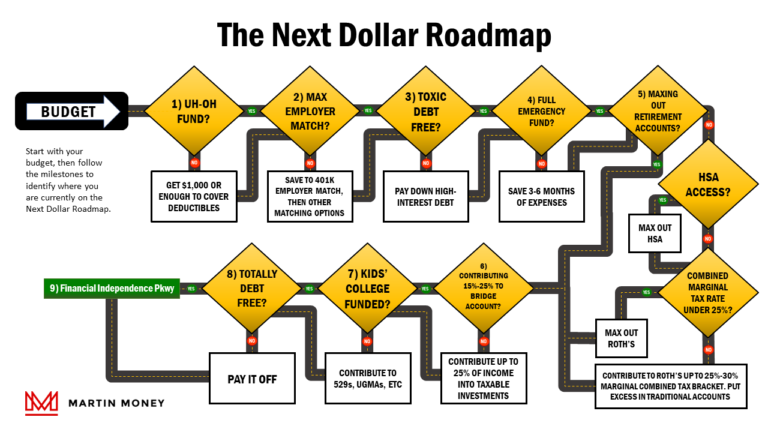Do I need a Financial Advisor?
The decision to seek out the services of a financial advisor should be driven by your knowledge and comfort with financial concepts, as well as the complexity of your personal situation.
Unfortunately, the nature of finance and investing is complex.
Toss in the Internal Revenue Code for good measure and it’s understandable why many cringe at the thought of trading their precious time to build a sound financial plan.
For many people, it’s so painful they’d prefer to just pay someone else to worry about it for them.
In fact, the financial services industry is a $5 Trillion (yes, with a ‘T’) behemoth that accounts for nearly 7.5% of our nation’s GDP by itself!
As you might imagine, where there are loads of money there are loads of people seeking to get a piece of the pie. And some of those folks have less than honorable motives for jumping in.
So, there’s a combination of factors at play when deciding whether or not to hire a financial advisor.
In this post, we’ll talk about the different scenarios in which one might consider partnering with a pro, as well as discuss how not all financial advisors are created equal.
Levels of Advice
Everyone’s financial circumstances are unique.
I’m made very aware of this each time I write a post to try and provide input for as broad an audience as possible.
Unique portfolios call for unique solutions, so there isn’t a one size fits all approach to money. Each case deserves its own evaluation and planning.
Some of these situations are exceptionally simple, most are kind of complex, and some are so expansive that they’re downright frightening for me to consider.
Let’s step through the spectrum of assistance that’s available and discuss how you might decide what’s appropriate for you.
Going Solo
PROS: Private. Forces you to learn. Basically free.
CONS: You’re on your own, bro.
Because you’re reading a personal finance blog, this is probably where you are.
To be honest, you’re the person we’ve created this for. In full disclosure, I’m a DIY’er when it comes to finance too.
But when is this an appropriate approach? I’d argue there are two cases in which such an approach is wise.
First, if you don’t have much money to manage anyway, there’s not much to get advised on.
Face it, if you’re in a place where the extent of financial management for you is paying bills each month and checking your account every two weeks to make sure the last paycheck made it in, there’s not much to sweat.
In fact, you should use this time to learn about managing cash flow, budgeting, and prioritizing the use of funds for debt, expenses, saving, and giving.
Everyone needs to have a solid basis in these fundamental concepts or you open yourself to the possibility of poor decisions or even being taken advantage of down the road.
You also don’t carry much risk of loss if your net worth is relatively low.
We’ll come back to this example, but a mistake with $1,000 is far more tolerable than a mistake with $1,000,000. The level of money means you don’t have to fret as you learn to navigate the financial world.
Second, you might fit in this camp if you just love learning about finance.
I’ve pointed out before that I’m a bit of a financial weirdo since this stuff is actually fun to me, but if you like learning as much as I do then maybe you should go it alone.
After all, there is no knowledge about finance that isn’t available somewhere in the world for free.
We are in the information age and education is out there for the taking for any one of us.
Feel insecure about taxes? Don’t understand investing? Want to know how most people save for retirement?
Volumes have been written about each of these topics and many, many more. All you have to do is look for it and spend some time absorbing it.
Hate reading? No problem. Most of this stuff is available in an audio version too.
Even the most complex strategies and rules are out there. Don’t be afraid to try and learn. It doesn’t cost you anything.
Finally, perhaps the most attractive parts of going solo are privacy and cost.
If you manage things yourself you don’t have to answer to anyone, you don’t have to justify your decisions, you can keep your wealth private, and you don’t have to pay anybody.
These are all attractive to me and contribute to my decision to fly solo (at least for now).
Using Robo-Advisors
PROS: Removes emotion. Easy to set up. Relatively inexpensive.
CONS: You’re not on your own, but there’s not much human input here. If you have complex circumstances, look elsewhere.
Robo-advisors are basically digital platforms that run a series of complex algorithms to select and invest in securities on behalf of their client.
When establishing the robo-advisor account, clients will run through a series of questions on a digital platform in order to set parameters for the robo-advisor to select investments.
Once the robo-advisor knows the client’s current situation and goals, it goes to work setting up an optimized portfolio for the client.
I like to think of them as a strategic investing autopilot. It has the features of a set-it-and-forget-it portfolio, but one that can also adapt to changes in the market and your portfolio.
There is very little human involvement in this process which makes them inexpensive, but also means unique circumstances could easily be overlooked.
For example, it is difficult to get a robo-advisor to understand concepts unique to estate planning or trust administration.
A robo-advisor also won’t know how accurately you’re rating yourself on psychological ranges like risk tolerance, but it uses these inputs to make decisions and projections with real money.
On the positive side, robo-advisors have an impressive degree of flexibility in building portfolios for unique preferences like ESG investments, focus on certain asset classes and types, or even various religious preferences.
Finally, robo-advisors can also watch securities trading and valuations 24/7 so if there’s an optimal time to tax loss harvest or rebalance your portfolio, they can be set to do just that.
Most robo-advisors generate revenue by charging a fee for assets under management (AUM). This is also how many reliable financial advisors collect fees, but robo-advisors do so at a fraction (usually ¼ or less) of the cost of a human financial advisor.
I think robo-advisors are a good option for people who have some combination of the following: a basic knowledge of investing, at least one year of income to invest, a reasonably simple financial portfolio, and/or a schedule that makes proper self-management challenging.
In other words, they’re a good middle ground between the DIY approach and hiring a financial advisor.
The Free Guy at Work or the Brokerage
PROS: It’s free. Financial advisor probably has unique knowledge about work plans or even your specific accounts.
CONS: These people can make very generalized assumptions about your situation. Their interests may not always align with yours.
I work for a large utility company. As you might imagine, we have a sizable 401(k) plan.
The plan custodian probably makes a princely sum managing our plan and in return, they offer employees at our company limited financial advice and even conduct free seminars from time to time.
I’ll confess that the information they convey is very simple and generalized, but it’s mostly good advice.
My wife and I also have IRAs and a taxable brokerage account with a large financial services company that I won’t name here (rhymes with Can-lard).
They too offer free advising services based on the value of assets in your various accounts. The more money you have, the more generous they are with these consultations.
I’ve only ever spoken with their financial advisors once because I got annoyed with how nosey they were about our goals and risk tolerance.
And that’s not a shot at them. That’s exactly what a financial advisor should do, I just found that I wasn’t comfortable having to explain myself, personally.
In both of these scenarios, it is in the interest of these financial advisors to assume more and more assets under management because the fees they collect for their services grow as your accounts do.
That doesn’t necessarily mean they give poor advice, but they’re probably never going to tell you to reduce or stop saving in the accounts you have with them.
In any event, just be aware of this potential conflict of interest as you discuss your financial circumstances and goals with these folks.
In my experience, these financial advisors are very knowledgeable and don’t seem influenced too heavily by potential conflicts of interest.
None of them have ever pressured me to save more and more with them with every breath.
You should know going in that you’re probably not going to get a very deep financial plan from these free advising sessions or seminars.
Typically, there is an opportunity for these investment companies to steer customers toward a fee-based advising program of some sort, so the “advice” is very generalized and shallow in nature.
In summary, if you have questions or are curious about options that are available to you from brokerages like these, it doesn’t hurt to hear what they have to say.
In fact, they may share something that turns out to be quite insightful or valuable to you.
A Professional
PROS: Good, dependable advice, specific to you. Thorough planning.
CONS: Expensive. Vast range in quality of advice.
A professional financial advisor is someone who makes a living by providing individual financial advice to their clients.
The range of qualifications here is pretty broad.
On what I’ll call the “lower” end of the spectrum you have financial advisors who may or may not hold degrees from accredited universities and navigate the necessary steps to be licensed to sell securities and/or insurance products in a given state.
Many of these licenses are obtainable by taking exams designed to confirm a candidate’s basic knowledge of the products they plan to sell and applicable laws.
These exams do not necessarily test one’s ability to actually provide sound financial advice.
On the “higher” end of the spectrum are well-educated, knowledgeable individuals with certifications and experience galore.
In addition to the required licensing, better-quality financial advisors will typically have obtained various designations from various financial organizations that certify their capabilities.
We’ll get into these certifications in our next post.
For now, the primary thing we wanted to point out is that not all financial advisors should be trusted to provide competent advice that serves your interests first.
There are many “advisors” whose primary goal is to sell whatever products generate the highest commissions for themselves, regardless of whether or not it is the best option for their client.
In order make to better differentiate financial advisors who act in your best interests from those who do not is to explain the concept of a fiduciary.
In short, a fiduciary is someone (or a group of people) who provides financial advice that is given in your best interests and has a legal obligation to do so.
This legal obligation exposes the financial advisor to penalties, lawsuits, and even losing their licensing if they fail to honor this responsibility.
Not all financial advisors are fiduciaries. We’ll talk more about how to find those that are in our next post.
So, Do I Need One or Not?
This decision of whether or not to hire a financial advisor is quite personal, but here are some things to help you decide.
Are your finances just really simple?
Then no, you probably don’t need a financial advisor.
Instead, I’d encourage you to become a student of personal finance and learn as you go. Read books, check out blogs, YouTube topics, and of course, you should follow the Next Dollar Roadmap.
You should even try doing your own taxes. Even if you hire a tax pro, taking the time to go through the process on your own is very educational (even if it is rather unpleasant).
You may even find that your tax preparer is missing deductions and costing you money above and beyond their fees.
Many of them do get busy in tax season and tend to rush through 1040s like a chubby kid over a happy meal.
There’s certainly no harm in trying and once you’ve collected your documentation you’ve done over half the work anyway.
Do you hate thinking about, learning about, and hearing about money?
If so, you may be a well-suited candidate for a financial advisor. No one can afford to just completely ignore their finances and just hope it all works out.
You’re likely to lose more out of neglect than you’ll pay in fees to a financial advisor.
On the other hand, if you are a financial geek and spend your spare time learning about investing, retirement, taxes, etc., then maybe you don’t need a financial advisor.
The more confident you feel in managing your finances, the more likely you are to be able to handle it on your own.
Finally, if you have an interest in finances but feel completely clueless, there’s no harm in calling in a pro to help you learn.
You can always walk away from their services down the road, though this isn’t always an easy thing to do.
How much do you have anyway?
If you have accumulated a significant net worth then you may consider working with a financial advisor, even if you feel very knowledgeable and confident in your abilities.
The reason is the effects of your mistakes are more significant as you handle larger sums of money. At the very least, having an extra set of eyes reduces the likelihood that you’ll run into a problem.
I think it’s also worth noting that many financial planners actually use the services of another financial planner for their own planning.
They’re not immune to tunnel vision and groupthink, so this practice helps keep their eyes sharp as they review their own clients’ portfolios.
How much do you need?
It may seem simple enough to set a net worth goal for retirement, but it’s not.
- What about inflation?
- What’s your expected rate of return and will it change with age?
- When are you going to take social security?
- What sources of income will you have?
- What’s your plan for health insurance?
- Should you start converting your 401(k) or IRA to a Roth?
- If you retire early how are you going to fund the years preceding qualified withdrawals?
There are many rules of thumb, but financial planners have experience planning scores, even hundreds of retirements for their clients.
They know the questions to ask and have the software to project myriad possibilities for your future.
What’s more, even if you don’t want a planner to manage your assets many will accept a flat fee for generating a thorough financial plan for you.
Conclusion
In summary, no, you don’t need a financial advisor, but one may be helpful depending on your circumstances.
I’m going out on a limb and assuming that since you’re on a financial website and you’ve read all the way to this point, you’re probably okay handling it on your own*.
However, as you accumulate significant wealth, money is going to just get more complicated. Keep an open mind about how a pro may be able to help you someday.
* We are not licensed financial professionals. This website is for information and entertainment only. Nothing on this site should be considered legal, accounting, or other professional advice. You should reach out to a qualified professional before making your own decisions.







